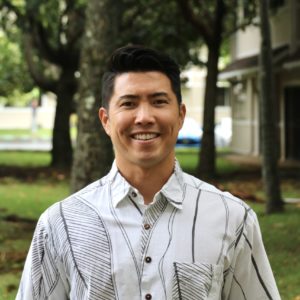Ethan Chang
Educational Administration Assistant Professor

“My future plans broadly encompass working in partnership with communities here in Hawai‘i to co-produce knowledge that can affect meaningful educational and social change.”
Hometown
Kailua, O’ahu
Department
Educational Administration
Where did you work before joining the COE?
I spent the previous academic year as a postdoc in the Asian American Studies and Black Studies Departments at UC Santa Barbara after earning my PhD in Social and Cultural Contexts of Education from UC Santa Cruz. Prior to that, I was a special education teacher at Waialua High and Intermediate School.
Briefly describe your own road to higher education.
The road was circuitous. I knew that I cared about and wanted to be involved in the civic education of young people. It was really the experiences of failing and feeling incapable of turning these aspirations into a reality that encouraged me to return to school. My PhD training provided tools to begin analyzing the root causes of education inequities and to partner with the most marginalized youth, families, and communities to transform these very inequities.
How did you become interested in the field of educational administration?
I became interested in educational administration as a direct beneficiary of effective leadership. Experiencing the far-reaching consequences of ethical and responsive leadership moved me to want to understand how leadership can transform individual lives and organizational cultures. I’m excited to work with students who will be in positions to affect that kind of change across K–12 schools and communities here in Hawai‘i.
Why did you select the UHM COE?
Working at UHM COE was always a goal of mine. I just didn’t expect the timing to work out the way it did. I received my teaching credentials at UHM COE (shout out to my adviser, Dr. Kavita Rao, and mentor, Aileen Soma). UHM COE is also a place that values community-based and community-accountable research, which I consider foundational to my scholarly praxis.
How would you describe the educational administration program to prospective students?
My understanding is that we’re a program that’s tailored to people who feel a sense of responsibility to communities and groups beyond themselves. So we support aspiring leaders to facilitate the learning and leadership development of others – be they classroom teachers, young people, or community members – to then build power and demand the kinds of education they need, want, and deserve. So EDEA is not a program for those who want to be school heroes or superstars. Instead, it’s a program that emphasizes collective, broad-based understandings of leadership in solidarity with most and multiple marginalized communities.
Who was your biggest inspiration along the way in your education and career?
My PhD adviser, Ronald David Glass, has been a major source of inspiration. I think effective mentors have a knack for sensing what you have to offer even before you’re quite aware of it yourself. He’s lived a life in struggle and has paved a path for exploring how education might be used to transform society, which I continue to draw inspiration from today.
What are your future plans?
My future plans broadly encompass working in partnership with communities here in Hawai‘i to co-produce knowledge that can affect meaningful educational and social change. I also identify as an Asian settler, and I’m returning to a place I’ve called home. My future plans are bound up with efforts to learn about a past that’s been obscured from me and discerning how my scholarship, teaching, and service might be made accountable to Native Hawaiian and other marginalized communities in Hawai‘i.
